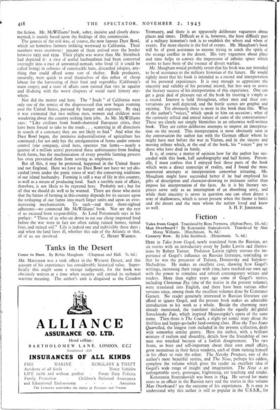Tanks in the Desert
Come to Dust. By Robin Maugham. (Chapman and Hall. 7s. 6d.) MR. MAUGHAM was a tank officer in the Western Desert, and this account of his experiences has considerable historical value. Super- ficially this might seem a strange judgement, for the book was obviously written at a time when security still carried its technical wartime meaning. .The author's unit is -disguised as the Crendon
Yeomanry, and there is an apparently deliberate vagueness about places and times. Difficult as it is, however, the least difficult part of a military historian's task is to establish the where and when of events. Far more elusive is the feel of events. Mr. Maugham's book will be of great assistance to anyone trying to catch the spirit of the strange conflict in the desert. His very vagueness about place and time helps to convey the impression of infinite space which seems to have been of the essence of desert warfare.
Mr. Maugham would probably retort that his book was not intended to be of assistance to the military historian of the future. He would rightly insist that his book is intended as a record and interpretation of his personal experiences. It is easy enough to appreciate the sincerity and validity of his personal record, but less easy to assess the literary success of his interpretation of this experience. One can get a great deal of pleasure out of the book by treating it simply as a record. Interest is held throughout, other men and their con- versations are well depicted, and the battle scenes are graphic and exciting. Yet obviously there is more in the book than this. What of the author's "voices," which speak to him on occasion ; what of the curiously stilted and unreal nature of some of the conversations? These are clearly not simply blemishes in an otherwise. well-written book. They are rather deliberate attempts to impose an interpreta- tion on the record. This interpretation is most obviously seen in the conversation the author has with the German officer whom he might have met before the war in Vienna, and in the sincere and moving tribute which, at the end of the book, his " voices " pay to those who have died in battle.
It is, of course, a matter of opinion how far the author has suc- ceeded with this book, half autobiography and half fiction. Person- ally, I must confess that I enjoyed best those parts of the book which were a direct transcript of reality, and I found the more mannered attempts at interpretation somewhat irritating. Mr. Maugham might have succeeded better if he had employed his gifts of description and character-drawing to insinuate rather than impose his interpretation of the facts. As it is his literary set- pieces serve only as an interruption of an absorbing story, and while their sincerity is never in question one can often detect a note of shallowness, which is never present when the theme is battle and the desert and the men whom the author loved and knew






























 Previous page
Previous page